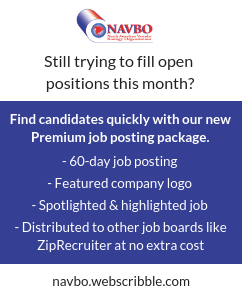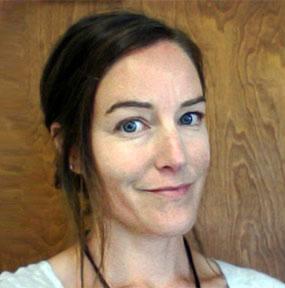Vascular Biology
Monterey, CA
Lymphatic Forum 2019
Austin, TX
May 30 - June 1, 2019
Vasculata 2019
Medical College of Wisconsin
July 13 - 18, 2019
|
UT Southwestern
Medical Center
|
|
Partner Network Advantage - New Job Board Feature
|

Why post your job on NAVBO's career center rather than going directly to the larger job networks?
Pricing on the mass job boards can vary, but to get a job noticed you typically have to sponsor it for $5 - $10 per day, which can add up quickly especially since you also pay for each click the job gets. When you add it all together, you could be spending up to $45 per day on your job posting. But, when posting a job on NAVBO's career center, you simply pay a flat fee! The Premium package includes our Exclusive Extended Partner Network - which means the jobs are broadcast to sites like ZipRecruiter and Jobs2Careers and more for a flat fee.
With special member pricing, you can post a job for as low as $300 with this Partner Network. You never pay for each click, just the flat fee on the NAVBO career center. In addition, the Premium package includes a 60-day job posting making it a great value. The Premium packages also offer features like having your company's logo featured on the career center homepage, having your job appear first in search results, and more.
|
Shop at Amazon?
Help Support NAVBO
|
|
 |
|
 |
Call to Action!
NAVBO, with the help of Research!America, is keeping abreast of funding issues that matter to our members. However, we need your help to make a difference. Research!America recently provided us with these tools:
Sequestration is back.
The return of progress-stifling budget caps places science funding in jeopardy. Under the 2011 Budget Control Act, Fiscal Year 2020 (FY20) defense spending must be cut by $71 billion and non-defense discretionary (NDD) spending by $55 billion relative to the current federal budget. Unless Congress passes and the president signs a bill raising the FY20 budget caps, cuts to science agency budgets are inevitable. Realistically, no federal agency that supports research and technology will be spared.
That's why Research!America, together with 19 partner organizations from across the science spectrum, is
launching a targeted advocacy campaign with two goals in mind:
- Secure a bipartisan deal in Congress to raise the "sequestration" budget caps, which need to be lifted or funding for NIH, CDC, NSF, FDA, and AHRQ are in jeopardy;
- Make the case that these and other science agencies need and deserve increased funding: economic, health and national security depend on science investment.
Help us make the case.
Here's what you can do:
Share
your ideas with us - what are your top five reasons to raise the caps and increase science funding? What does the future hold if we falter in science investment? Have you seen compelling visuals making the case for funding science? Pass them along. The RTC Campaign will be more successful if you lend your creativity and strategic thinking to it.
|

Abstract deadline extended to March 29!
Submit your abstract today
Please download and post one or both of these flyers:
Thank you!
|
|
Next Webinar - William Sessa
|
 Lipid Metabolism by the Endothelium Lipid Metabolism by the Endothelium
Join us on April 11 - at 1:00pm EST for a webinar with Dr. William C. Sessa of Yale University School of Medicine, recently named the 2019 Earl P. Benditt Awardee by the NAVBO Meritorious Awards Committee.
NAVBO Webinars are free for current NAVBO Members.
Don't Miss These Upcoming Webinars:
May 2 - Joyce Bischoff, Boston Children's Hospital
June 13 - Daniel Greif, Yale University
July 11 - Kishore Wary, University of Illinois at Chicago
And don't forget you can watch archived webinars as well - go to
|
 Introducing ACS Pharmacology & Translational Science Introducing ACS Pharmacology & Translational Science
ACS Pharmacology & Translational Science
is a new journal from the American Chemical Society publishing high-quality, innovative research across the broad spectrum of biological sciences.
|
|
Lessons Learned
(from the March 7 issue)
|
Dr. Corinne Nielsen 
My name is Corinne Nielsen, and I have been an Assistant Professor, in the Department of Biological Sciences, at Ohio University since 2016. I am pleased to introduce you to our lab and our research and to share some Lessons Learned, as a new independent investigator.
Embrace your new pace
One of the biggest adjustments I made was to adjust my expectations for the pace of research in a newly established lab. During my PhD and postdoctoral training, my academic life focused on lab work and very little else. Suddenly, with many more commitments - from teaching obligations to lab management to proposal writing - I spend less time in lab and acquire fewer data than I am used to. As the lab has found its footing, and as new lab members receive training and develop independence, the pace has quickened; however, this transition taught me another lesson, which is to...
Learn to give up control
Micromanaging the details of every lab protocol and daily troubleshooting is not tenable or healthy, for the long-term benefit of the lab. Give lab members the training and tools to complete an experiment, meet regularly to discuss outcomes/results, and celebrate the achievements.
Be prepared to face roadblocks
While I was setting up my lab (and especially while establishing and working with an animal colony), I naively assumed that moving from Point A to Point B would follow a straight path; rather, I often journeyed down a zigzag path, peppered with setbacks and side trips. Along the way, I realized that as long as we kept moving forward, even though more slowly than expected, we were headed in the right direction, and the only option was to tackle and overcome the roadblocks, one at a time.
Read more on the NAVBO website about Dr. Nielsen's thoughts on spending money, taking time to write, developing long-term professional goals and collegiality.
|
|
Spotlight on Trainees
(from the March 7 issue)
|
Subtle pressures that erode scientific impact and public trust
Research ethics and academic integrity should be in the forefront of our minds as we undertake new studies and support our findings. Mentors and educators have a moral obligation to impart to their trainees the values that underpin our trust in one another's work and fulfill our obligations to those who sponsor our work. This issue is addressed in Rigor Mortis: How Sloppy Science Creates Worthless Cures, Crushes Hope, and Wastes Billions, written by NPR science correspondent Richard Harris and published in 2017. The book, which considers a spectrum of contributing factors, was inspired in part by the 2014 report from scientists at Amgen that an alarmingly high percentage of promising biomedical studies could not be replicated.
|
Welcome to our New Members:
Brittney Garner, University of Arkansas for Medical Sciences
Sydney Ginn, Georgia Institute of Technology and Emory University
Yasuko Iwakiri, Yale University School of Medicine
Abhishek Jain, Texas A&M University
Tim LeCras, Cincinnati Children's Hospital Medical Center
Rebecca Levit, Emory University
Denise Marciano, University of Texas Southwestern Medical Center
Eleftheria Michalaki, Stanford University
|
|
Recent Publications by NAVBO Members
|
| Endothelial miR-30c suppresses tumor growth via inhibition of TGF-β-induced Serpine1
Journal of Clinical Investigation
In tumors, extravascular fibrin forms provisional scaffolds for endothelial cell (EC) growth and motility during angiogenesis. We report that fibrin-mediated angiogenesis was inhibited and tumor growth delayed following postnatal deletion of Tgfbr2 in the endothelium of Cdh5-CreERT2 Tgfbr2fl/fl mice (Tgfbr2iECKO mice). Read more Loss of Endothelial Derived WNT5A is Associated with Reduced Pericyte Recruitment and Small Vessel Loss in Pulmonary Arterial Hypertension
Circulation
Background: Pulmonary arterial hypertension (PAH) is a life-threatening disorder of the pulmonary circulation associated with loss and impaired regeneration of microvessels. Read more |
Industry News (from the March 7 issue)
|
Has the time come to establish a US advisory board for research integrity?
Writing in Nature, C. K. Gunsalus of the University of Illinois, Urbana-Champaign and colleagues call for the establishment of a national policy board that focuses on the robustness and quality of research findings. The authors recount, and lament the limitations of, previous efforts to define and address systemic problems in the medical research enterprise. Priorities of the policy board would include providing guidance on "...addressing issues related to authorship, raising the quality of peer review, educating researchers on responsible conduct and robust analysis, streamlining research administration and assessing the research environment."
Disrupted sleep and vascular integrity?
From the Twitterverse comes, via Hellmut Augustin, an alert to the
recent contribution from NAVBO members Filip Swirski and Peter Libby linking sleep, or the lack of it, to the pathophysiology of hematopoiesis and atherosclerosis. The authors report that mice whose sleep patterns were experimentally fragmented produce more Ly-6C-high monocytes, develop larger atherosclerotic lesions, and produce lower levels of hypothalamic signaling agents that normally dampen myelopoiesis by limiting pre-neutrophil CSF1 in the bone marrow. Such a neuro-immune axis could effectively connect sleep quality to immune function and cardiovascular disease.
|
 |
Your data privacy and security are important to NAVBO. To that end, we have updated our privacy policy to reflect recent privacy and security regulation implementations and changes.
Please review our policy as time permits so you have a complete understanding of the data we have, why we have it, and how we use it.
Part of the updates relate directly to the European Union's new General Data Protection Regulation (GDPR) that went into place May 25. The GDPR seeks to improve the transparency of data usage and give end users more control over their own data. We believe these changes are important and will be compliant with the GDPR regulations.
Contact NAVBO if you have any questions or to
change your communication preferences.
Please note, you can unsubscribe to this newsletter at anytime by clicking on the SafeUnsubscribe in the footer.
|
|
|